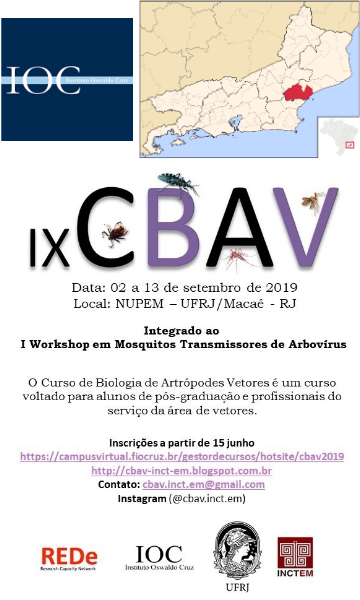
 Arbovirus-transmitting mosquitoes
Arbovirus-transmitting mosquitoes
2nd – 13th September 2019
Instituto Oswaldo Cruz, Macaé (RJ)
In Brazil, the emergence and re-emergence of diseases of high mortality and morbidity exacerbates public health conditions in the current economic crisis in the state of Rio de Janeiro and across the country. The major diseases caused by vector-borne pathogens account for 17% of infectious diseases worldwide causing more than 1 million deaths annually.
In addition, the lack of treatment and vaccines, and the inefficiency of combating vectors by increasing resistance to insecticides makes it difficult to control diseases.
Within the course, a two-day workshop on “Arbovirus-transmitting mosquitoes” took place. This workshop targeted postgraduate students from across diverse research groups (in the field of arthropod vectors and vector-parasite interaction) in Brazil and Latin America, as well as vector-based health professionals working in municipal and state health secretariats.
The 9th Annual Course on Biology of Vector Arthropods aimed to provide students and practitioners with a theoretical and practical background on the major topics relevant to hematophagous arthropod biology through practical sessions on the identification of adult mosquitos, collection of eggs and the dissecting of mosquitoes.
To learn more about the content of the workshop, access the full programme or download a full summary report of the workshop.
The workshop talks are available online on the NUPEM YouTube channel.
The protocol used in the practical activity has been made available (in Portuguese), so that other researchers based in other settings around the world can make use of it.
Please watch the following short interviews to hear directly from the workshop participants, offering insight into their experiences and the value of such initiatives
Watch Aurea's full video | Watch Janimayri's full video
CHECK IT OUT!
The Global Vector Hub - the new TGHN hub aiming at transforming the way vector control and vector research communities operate and communicate, by providing a platform for sharing and disseminating data and information on vectors. Click on the banner below to explore!
